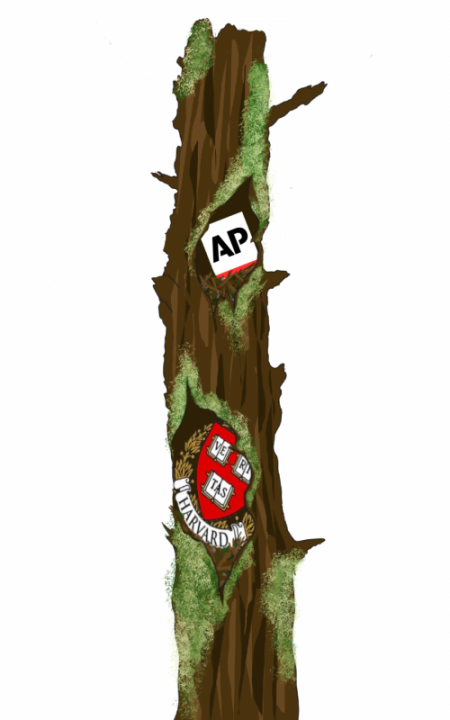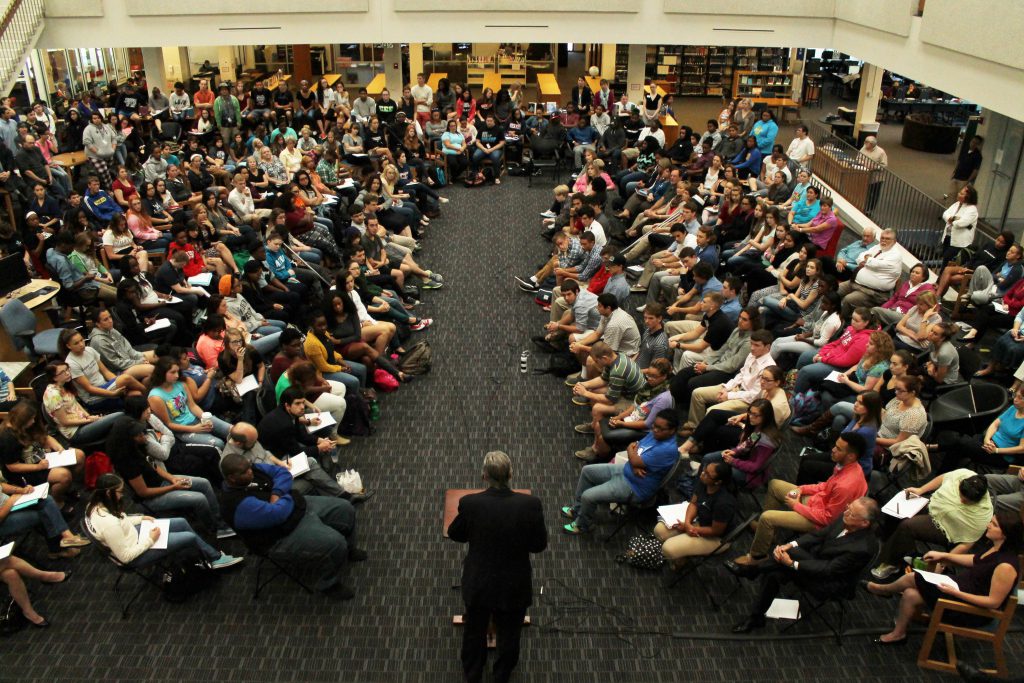Kyla Robberecht|Marlin Chronicle
AP readmitted
A federal judge decided that the current U.S. administration’s barring of the Associated Press (AP) was unconstitutional under the First Amendment on April 8, according to a CNN article.
According to an April 14 AP article, an AP reporter was barred from an event despite the ruling. The article said “a reporter and photographer from The Associated Press were barred from an Oval Office news conference on Monday [April 14] with President Donald Trump and his counterpart from El Salvador, Nayib Bukele.”
This reversal is already in practice. “Later Monday, two AP photographers were admitted to an event honoring Ohio State’s championship football team on the more spacious South Lawn. A text reporter was turned away,” AP said.
The ban originated from a dispute between the AP and U.S. administration due to AP retaining the term Gulf of Mexico instead of the administration’s new “Gulf of America.”
In an April 8 AP article addressing the continued ban, the judge, Trevor McFadden, said his ruling “does not bestow special treatment upon the AP … But it cannot be treated worse than its peer wire service either.”
McFadden, according to the CNN article, wrote that the Court orders the government “to put the AP on an equal playing field as similarly situated outlets, despite the AP’s use of disfavored terminology.”
McFadden said that the ban has lasted for roughly two months, according to the CNN article.
“The AP has been economically hemorrhaging for the last two months, and its condition will only worsen as its customers flee to other news services absent injunctive relief,” McFadden said.
In the same article, AP’s chief White House correspondent, Zeke Miller, and the AP’s chief photographer in Washington, Evan Vucci, agreed the ban impeded AP’s ability to report as effectively or quickly.
National forests for logging
In response to forest fires, the U.S. administration ordered 59% of Forest Service lands open to logging, according to an April 4 ABC News article.
The April 1 executive order, “Immediate Expansion of American Timber Production,” said the purpose was timber production, forest management and wildfire “risk reduction projects.”
The order instructed all relevant agencies to eliminate or alter “all undue delays within their respective permitting processes related to timber production” and “regulations, orders, guidance documents, policies, settlements, consent orders, and other agency actions that impose an undue burden on timber production.”
Agriculture Secretary Brooke Rollins said a “forest health crisis” has been caused by wildfires, insect and disease outbreaks, among other factors, according to the article. She said logging would help with these issues.
The article said that “environmentalists rejected the claim that wildfire protection was driving the changes to forest policy.”
Blaine Miller-McFeeley of the environmental group “Earthjustice” said this choice benefits the timber industry and does not consider the protection of communities.
The article said the order “exempts affected forests from an objection process that allows outside groups, tribes and local governments to challenge logging proposals at the administrative level before they are finalized.”
The 176,000 square miles of land (larger than California) spans much of the U.S., but predominantly through the South and West, according to the article.
The order, according to an April 12 Los Angeles Times article, will include all of California’s 18 national forests.
Harvard funding
After Harvard University’s decision to not comply with policy changes requested by the U.S. administration, the administration announced it would cut significant funding, according to an April 14 CNN article.
Among the policy reforms requested, the article listed “the elimination of Harvard’s diversity, equity and inclusion programs, banning masks at campus protests, merit-based hiring and admissions reforms and reducing the power held by faculty and administrators ‘more committed to activism than scholarship.’”
The University’s President, Alan Garber, said, “No government – regardless of which party is in power – should dictate what private universities can teach, whom they can admit and hire, and which areas of study and inquiry they can pursue,” according to the article.
The same article quoted Harvard Law School professor Nikolas Bowie, who said the administration “is violating the First Amendment […] by demanding that if universities want to keep this money, they have to suppress our speech and change what we teach and how we study.”
“$2.2 billion in multi-year grants and $60 million in multi-year contract value” were announced to be frozen, and “Harvard’s endowment was $53.2 billion in 2024, according to a financial report from the university.” Harvard is not the first higher education university to have its funding cut.
An April 15 NBC News article said that while Harvard has the largest endowment of U.S. universities, the median endowment of U.S. colleges and universities is $243 million.
Harvard is unable to use this endowment as a substitute for the federal funding. Catharine Bond Hill, former president of Vassar College and managing director of the research and consulting organization Ithaka S+R explained the difference between these funding sources. The money “comes from donors, including alumni, foundations, local community members or anyone else looking to support the institutions’ spending,” Hill said in the article.
The article also referenced Liz Clark, vice president of Policy at the College Business officers group, who said the endowments are agreements with donors that must legally be withheld.
Cecilia Orphan, an associate professor of Higher Education at the University of Denver, said in the article that funding cuts to Harvard will have a global impact. Orphan said that Harvard researches topics, “including cancer research and weapons development and other strategic concerns that we might have as a country and the world has.” The funding cuts will likely pose challenges for Harvard’s research.
By Isaac Fick


